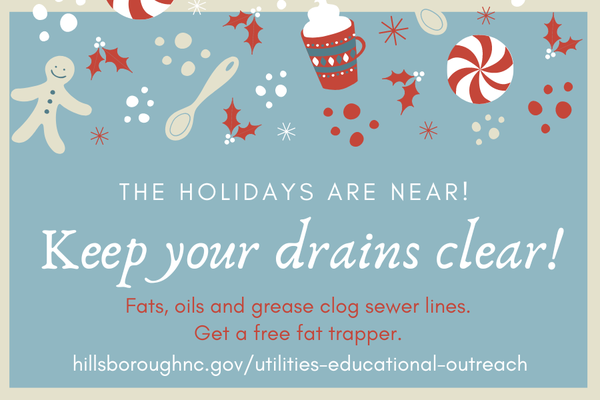Your Sewer System Needs a Gift: Keep Grease Out
Washing food scraps and grease down drains clogs pipes. Get a free fat trapper from the town.

As you’re preparing holiday treats or cleaning up afterward, give your sewer system a gift by keeping grease out of your drains!
Why to keep grease out
Washing food scraps and grease down kitchen sinks is the second leading cause of clogged pipes. The main cause is flushing so-called “flushable” wipes and other personal hygiene and cleaning products down toilets.
Blocked pipes can lead to sewer overflows in and out of your home, which can be costly to the environment and your pocket:
- Your responsibility — A sewer blockage that occurs between a house and its sewer cleanout pipe is the responsibility of the homeowner. The sewer cleanout pipe is the capped pipe at the edge of a road right of way. If you don’t have a town-maintained cleanout pipe, you are responsible for any blockages that occur in the sewer service line from the house to the main sewer line.
- Shared responsibility — The town will clear blockages in the sewer main or service line from the cleanout pipe at the edge of the road right of way to the sewer main. Yyur sewer fees help pay for this work. A large number of clogged pipes and sewer overflows could lead to higher fees.
How to keep grease out
To keep fats, oils and grease out of the sewer system:
- Discard used grease with other garbage or recycle it.
- Avoid or minimize use of your garbage disposal.
- Scrape plates into trash cans.
- Use paper towels to wipe leftover oils and fats from pots and pans before washing them.
The town has fat trappers available for free to Hillsborough water and sewer customers. Each kit contains a fat trapper container; two foil-lined bags that can withstand temperatures up to 150 degrees; a pan scraper; and a sink strainer. Once a bag is filled, it can be sealed and disposed with garbage.
“The countertop fat trappers are great for storing used cooking fat from beef, chicken, fish and pork,” Miller notes. “With the ultra-durable foil liners, you do not have to wait until the grease has solidified to pour it in the bag. The bags also zip lock, so they are resealable and reclosable. They are great for locking out the smell and will not spill.”
To receive a fat trapper kit or additional bags, contact Utilities Infrastructure Protection Supervisor Troy Miller at 919-296-9653 or by email. Put “fat trapper” in the subject line.
To recycle used cooking or fryer oil, you can take up to 15 gallons per visit to an Orange County household hazardous waste collection center. Only liquid oil is accepted. No water, bacon grease or lard is accepted. Visit:
- 1514 Eubanks Road, northwest of Chapel Hill
- 3605 Walnut Grove Church Road, north of Hillsborough
More information
For more information on the town’s fats, oils and grease program, contact the utilities infrastructure protection supervisor, Troy Miller, at 919-296-9653 or by email.
For information on recycling used oils or the hazardous waste collection center hours, visit the Orange County government website or contact the Orange County Solid Waste Management Department at 919-968-2788 or recycling@orangecountync.gov.
Orange County is developing a Road to Zero Waste master plan. See the Solid Waste Master Plan page to view the draft plan to reach zero waste by 2045.
Related documents
![]() Proper Disposal of Fats, Oil and Grease (English and Spanish)
Proper Disposal of Fats, Oil and Grease (English and Spanish)




